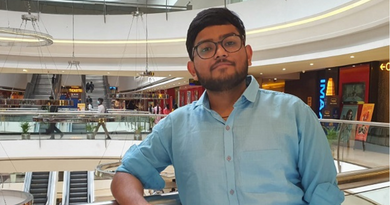Electronics internship at TECHB – Spreading technical education in villages

About the Author: Arpita Dutta, a student of Bhilai Institute of Technology, Durg, talks about her internship experience that helped her spread the wave of technical education to villages.
While doing a training in embedded systems in the final year, my mentor informed me about the internship opportunity at TECHB. So I applied with an updated resume and within a week, I was shortlisted. The selection procedure consisted of two round – a written test and a personal interview. The test was an hour long and consisted of MCQs on the basics of electronics like microcontrollers, Arduino basics, Arduino programming, and various kinds of ICs and semiconductors. It also had some short questions on programming basics. After the test was over, all the applicants were asked to wait for an hour. Out of the 30 students that had given the test, only 17 students qualified for the interview.
I was nervous as well as excited for the interview. The interviewer asked me to introduce myself, which I had anticipated and prepared for. It was followed by questions on the details of the training that I had done in my field. Next, I was told that I would be trained in electronics and if everything went well, I might be sent for taking workshops. I was asked if I would be able to handle that. I replied that public speaking was one of my strengths and I had organised workshops before, so I would definitely be able to handle that. And as I loved electronics, I would enjoy my work too. Then I was asked to give the details about the workshops that I had organised previously, which I did eloquently. In the end, I was asked if knew about Atal Tinkering lab or Atal Innovation Mission. I had no idea about it at that time and replied honestly. This was followed by a technical round in which I was asked questions like:
a) What are semiconductors, transistors, and capacitors? Explain using real-life examples.
b) What is Arduino? Name 6 Arduino boards?
c) What’s the pin structure of Arduino?
d) How the value of crystal oscillator is decided and what is its value for Arduino Uno? Why do we use crystal oscillator?
e) What are the ATMEGA328 memory allocations?
f) What are accelerometer and magnetometer used for? Name the IC and give examples?
g) Few basic questions on C++ programming because in my resume I had mentioned that I did a course on C and C++.
The next day they called me and extended the offer letter with a monthly stipend of INR 20K per month! The office had a quiet, warm, and soothing ambiance. On the first day, we had an orientation program in which they described our job profile and the work we would be doing. That’s when I came to know that TECHB is an indicative vendor for Atal Tinkering Lab, which is an innovative step under Atal Innovation Mission by NITI Aayog. As a part of this initiative, Atal Tinkering Laboratories (ATLs) are being established in schools across India. The objective is to foster curiosity, creativity, and imagination in young minds and inculcate skills such as design mindset, computational thinking, adaptive learning, physical computing, etc. The labs contain educational ‘do it yourself’ kits and equipment on – science, electronics, robotics, open source microcontroller boards, sensors, 3D printers, and computers. Other desirable facilities include meeting rooms and video conferencing facility. Our job was to give training to students about basics of electronics and robotics. I was explained about the modules, the packages that we will be explaining, and all other details related to the training process.
Soon, my training started. I was asked to give presentations on how I would teach those concepts to students and make them do the hands-on project. I was given feedback and important inputs after my presentation. We covered topics like manual robotics, sensors, and various modules like GSM, voice recognition, RFID, WIFI, etc. After about 2 weeks of training, the supervisor was satisfied and gave me the green light for the trainer position. My first assignment was with Krishna Public School, Raipur. On my first day as ATL trainer in KPS Raipur, I took the orientation program of students as well as faculties. I was given the responsibility to make a day-wise teaching module and a power point presentation on the topics I would be teaching. I also wrote technical and non-technical content which was then published and handed out to students in the form of a booklet during the workshop.
I took a 9-day workshop there and taught the students about robotics and Arduino programming. I had to train 10 faculties and 30 students. Those 30 students were selected by a screening test held in the school. I began my training, starting with basics and then slowly moving towards advanced concepts. The sessions used to be for 3 hours, divided into two parts – 1.5 hrs of concept building and 1.5 hrs of hands-on project based on what we had learnt. We also made several projects like line follower robots, obstacle avoiding robots, LED matrix, etc. It was amazing seeing school students learn and perform these advance and innovative projects, and I felt proud of being a part of this. Some students also decided to work on projects of their own and I guided them. Even after the training was finished if the students faced any problem, they could contact the firm and it would provide them with solutions.
My next assignment was in Government Higher Secondary Schools in Basna and Narra, two villages in Chhattisgarh. The children couldn’t even speak fluent English, and so I started the training in Hindi, which was a new experience for me too. They caught up with the flow quite fast and performed really well. I honestly hadn’t expected them to do that good but I was happy to be proved wrong. I was really happy seeing those students work on various projects, bringing new ideas, and working with full enthusiasm. Apart from other projects, we also made a project on home automation on special demand of a student who wanted to learn to control the lights using his mobile phone.
The complete team of TECHB was very supportive and encouraging. The provided such friendly environment in the workspace. During this entire internship, I learned a lot more than I can express in words. I had some knowledge about embedded systems but making all those projects helped me strengthen my concepts. I learned to make better presentations. My communication skills improved and I became even more confident. In short, this internship gave me an experience that I’ll cherish forever.
Looking to apply your technical knowledge in the real world? Apply to these cool electronics internships and get started.
Editor’s note – If you also have an interesting story to share, you can now participate in Your Internship Story Contest 2017 and win cash prizes and goodies worth INR 1 Lac!



